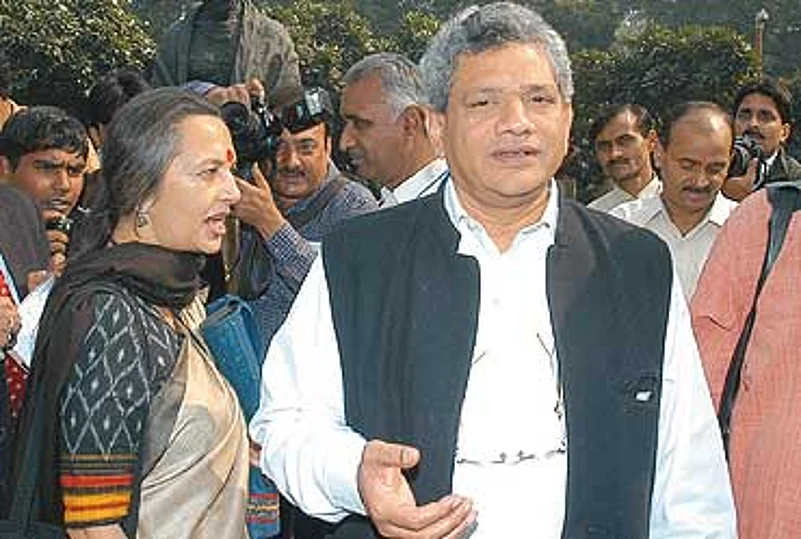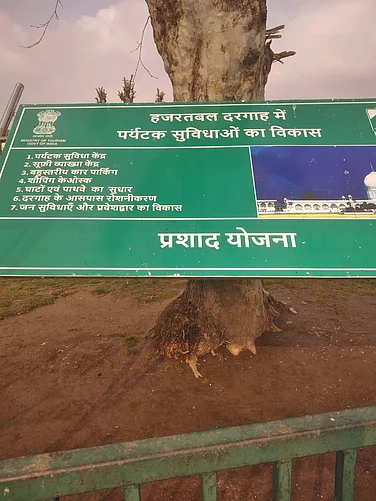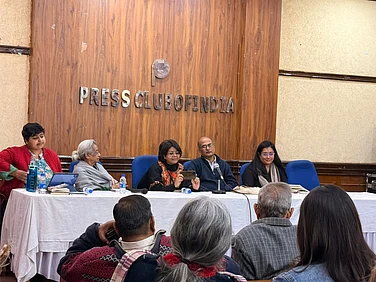A Tough Balancing Act
The ideological faultlines:
- Mismatch between priorities at the state and Centre
- Carving out a different identity from the UPA while backing it
- Learning to live with growing individualism in the party
- Blending people-friendly capitalism with market-friendly socialism
***
Leading the Left to spectacular victories in West Bengal and Kerala should have madeCPI(M) general secretary Prakash Karat stronger—even if comrades like to discount the role of individuals.Especially as these electoral successes crown his first year in the top job. Instead, the day the results came in, former West Bengal chief minister Jyoti Basu cast a dampener, saying, "Not only in the state, Buddhadeb Bhattacharya now will have to play a more crucial role in Delhi because of the differences between the Left and theUPA."
A senior CPI(M) leader told Outlook, "In party circles, this is being read as a very significant statement. There is a sense that theUPA leadership sees Prakash as inflexible and obdurate and it is in the CPI(M)’s interest that Buddhadeb—with his excellent equation with Manmohan Singh—should be used to smoothen out things." Is there some disappointment with Karat’s first year in office? The cautious reply is, "A more flexible approach might have helped the party extract more from theUPA on policy matters." However, Buddhadeb’s role would be "informal" as Karat and fellow politburo member, Sitaram Yechury, would still be the two attending theUPA coordination meetings.
The official spin is different: central committee member Nilotpal Basu says, "Jyoti Basu meant that the Bengal experience will have to be taken note of by the rest of India, even in the reforms process. We can now talk from a position of strength as our reforms—unlike say Chandrababu Naidu’s—wins elections." The recharged Bengal brigade—hardliners and moderates alike—feel their 30 years in power entitle them to a greater say in central party policy-making as their victory, they argue, is more significant than the one in Kerala: "We won Bengal because of performance, not merely on manifesto promises, as in Kerala. We’ve been in power for 30 consecutive years, not intermittently, as in Kerala," stresses a state secretariat member.
For Karat, the problems are twofold: First, his becoming general secretary coincides with a period in which theCPI(M) is trying hard to reconcile its long-term ambition of a socialist state—forge a Third Front in which it can play a dominant role—with running governments and winning elections within a capitalist framework. Second, he has a hard act to follow, coming as he does after Harkishen Singh Surjeet, who was a natural when dealing with ideologically diverse parties in an era of coalition politics.
Officially, the CPI(M) likes to dismiss this conflict as an oversimplification, as media shorthand, especially when this conflict isgiven a face by projecting it as a Karat versus Buddhadeb contest: hardliner vs moderate. Possibly, there is an element of exaggeration in this formulation, given that policy matters are thrashed out in the politburo where technically, each member has one vote; and the conflict is a result of the two posts the two men hold. Says Nilotpal Basu, "In Delhi, we question thegrounds on which policy is being formulated, and suggest an alternate model. In the state, we’ve to honour the mandate we have received and address the urgent problems of people’s lives and livelihoods. The different contexts leads to positions which lookirreconciliable."
Similarly, Yechury explains away Buddhadeb’s statement—"I am a communist making compromises with capitalism"—as "Buddhadeb is running a government within a bourgeois Constitution. State governments don’t have autonomy of decision-making. Our objective remains to establish socialism in India, but we’re currently working within a capitalist framework."

Ask how the CPI(M) will get its message across to the people, leading a double life as it does, one in Delhi and another in Calcutta—and now Thiruvananthapuram as well—and Yechury’s answer is: "The message of the victory is that the people understand us perfectly, even if the media doesn’t. They see us as working to fulfil their expectations, working within a framework that constrains us, as a force pushing theUPA to take a pro-people’s position." And then he adds, "We aren’t anti-reforms; we are pro-reforms if they are pro-people. We are anti-reforms if they are anti-people."
The view from Delhi would suggest that the CM’s electoral success—as much as the aura he has acquired in the reforms-friendly arena, or the persona that combines the rumpled Bengali bhadralok look with a taste for matters literary which makes him irresistible in EU circles—gives him the upper hand in the contest with Karat. Despite his understated charm, Karat is seen more as a reserved, ivory-toweridealogue.
Of course, in Bengal, even though a majority in the party is backing Buddhadeb, he has had to deal with the hardliners in ministry formation. He had hoped to replace old-timers he did not like—or want—with new faces, but it is proving difficult. And theCITU unit of Dunlop—given to a controversial industrialist for revival—has publicly asked the CM whether he is with the workers or the industrialists.
The media hype about "Brand Buddha" has also ruffled the feathers of some senior leaders—hence, counter-media reports on election data to prove that the party’s organisational strength rather than Buddhadeb helped the party sweep the polls. But such criticism is minimal. Both Jyoti Basu and state secretary Biman Bose—perceived as a hardliner—have put their weight behind Buddhadeb. As Basu said, "Buddhadeb is now an undisputed hero. I could not have delivered such a victory."
For the CPI(M), it is a tough call: making its West Bengal experiment look sufficiently different from Manmohanomics so that it can project an alternate model, and help it achieve first its goal of a Third Front in which it will play a dominant role on its way to a utopian socialist state. As for the individuals running the party, Yechury quotes Marx: "Men make history but not under circumstances chosen by them," and adds, "We don’t discount the role of individuals, but we also say they are above their material circumstances." That’s powerplay, Marxist-style.
with inputs from Jaideep Mazumdar


























